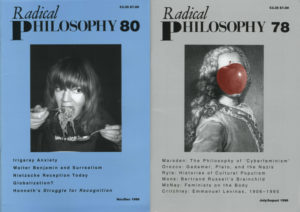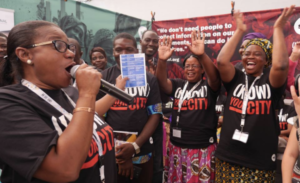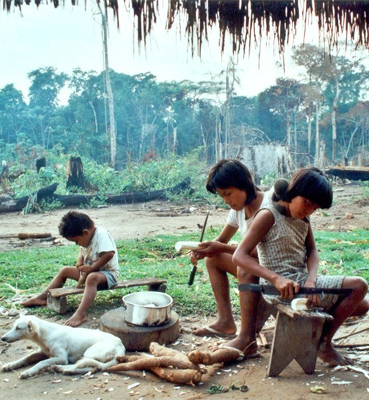NOS ~ Witte handel in zwarte mensen
 Elk jaar op 1 juli vieren we het einde van de slavernij. Wat gebeurde er precies en welke rol speelde Nederland in deze pijnlijke geschiedenis? In deze special een terugblik op ruim 200 jaar trans-Atlantische slavernij.
Elk jaar op 1 juli vieren we het einde van de slavernij. Wat gebeurde er precies en welke rol speelde Nederland in deze pijnlijke geschiedenis? In deze special een terugblik op ruim 200 jaar trans-Atlantische slavernij.
Nederland actief in de slavenhandel
Het is een bittere geschiedenis, de ruim twee eeuwen waarin Nederland actief is in de trans-Atlantische slavernij.
Het begint in de 17e eeuw als Nederland zich mengt in de strijd met andere Europese landen om rijkdom en winst te vergaren via koloniën in Noord- en Zuid-Amerika.
De Spanjaarden en Portugezen hebben dan al diverse koloniën gesticht in de Nieuwe Wereld en verschepen tot slaafgemaakte Afrikanen vanuit de kust van West-Afrika om op de grootschalige suiker-, koffie- en katoenplantages te werken. De oorspronkelijke bevolking wordt niet geschikt gevonden voor dit zware werk en is bovendien voor een deel door de kolonisten uitgeroeid.
Als de Nederlandse West-Indische Compagnie (WIC) in 1630 een deel van Brazilië verovert op de Portugezen, krijgt Nederland ook belangstelling voor de Afrikaanse slavenhandel.
De WIC verovert in 1637 een belangrijk bastion in West-Afrika op de Portugezen: fort Elmina in Ghana. Vanaf dat moment hebben de Nederlanders een machtsbasis op het Afrikaanse continent, waarvandaan ze kunnen meedoen aan de georganiseerde slavenhandel.
De Nederlanders verschepen zo’n 600.000 Afrikanen, 5 procent van het totaal van naar schatting 12 miljoen die tussen de 15e tot de 19e eeuw door de Europeanen als slaaf worden verhandeld.
Morele bezwaren zijn er nauwelijks. Terwijl slavernij in West-Europa verboden is, wordt de trans-Atlantische slavernij met de Bijbel in de hand verdedigd.
Ga naar: https://lab.nos.nl/projects/slavernij/index.html
Andere tijden ~ Leven in koloniaal Suriname – deel 1
Op 25 november 2017 was het precies 40 jaar geleden dat Suriname onafhankelijk werd. Andere Tijden zendt een tweeluik uit in aanloop naar de viering van 40 jaar onafhankelijkheid. Surinamers halen herinneringen op aan het leven in de kolonie vóór 1975. Na de Tweede Wereldoorlog krijgt Suriname algemeen kiesrecht en politieke partijen. Leidinggevende functies worden overgenomen door Surinamers; het Sranan wordt de eigen taal. Maar hoe kunnen de culturen in Suriname tot een eenheid worden gesmeed en kan de definitieve stap naar een eigen identiteit worden gemaakt? Een tweeluik met veel bijzonder filmmateriaal.
Ga naar: https://anderetijden.nl/Leven-in-koloniaal-Suriname—deel-1
The Entire Archives Of Radical Philosophy Go Online: Read Essays By Michel Foucault, Alain Badiou, Judith Butler & More (1972-2018)
 On a seemingly daily basis, we see attacks against the intellectual culture of the academic humanities, which, since the 1960s, have opened up spaces for leftists to develop critical theories of all kinds. Attacks from supposedly liberal professors and centrist op-ed columnists, from well-funded conservative think tanks and white supremacists on college campus tours. All rail against the evils of feminism, post-modernism, and something called “neo-Marxism” with outsized agitation.
On a seemingly daily basis, we see attacks against the intellectual culture of the academic humanities, which, since the 1960s, have opened up spaces for leftists to develop critical theories of all kinds. Attacks from supposedly liberal professors and centrist op-ed columnists, from well-funded conservative think tanks and white supremacists on college campus tours. All rail against the evils of feminism, post-modernism, and something called “neo-Marxism” with outsized agitation.
For students and professors, the onslaughts are exhausting, and not only because they have very real, often dangerous, consequences, but because they all attack the same straw men (or “straw people”) and refuse to engage with academic thought on its own terms. Rarely, in the exasperating proliferation of cranky, cherry-picked anti-academia op-eds do we encounter people actually reading and grappling with the ideas of their supposed ideological nemeses.
Read more: http://www.openculture.com/the-entire-archives-of-radical-philosophy-go-online.html
Robert Musil: Essays ~ Kapitel 1. Fragen der Zeit Politik in Österreich (1913)
Man denkt bei diesem Begriff zu einseitig an die Schwierigkeit der Nationalitätenfrage. Denn die – obgleich eine Schwierigkeit – ist längst eine Bequemlichkeit geworden; über einen ernsten Anlaß hinaus ein uneingestandenes Ausweichen und Verweilen. Wie bei hohlen Liebenden, die immer neue Trennungen und Widerstände überwinden, weil sie schon ahnen, wie wenig sie am ersten Tag der Hindernislosigkeit noch miteinander anzufangen wissen werden. Wie Leidenschaft überhaupt nur ein Vorwand ist, keine Gefühle zu haben. Wenn die große Abrechnung beendet sein wird, wird es ein Glück sein, daß die schlechten Manieren, die man inzwischen angenommen hat, auch aus nichtigen Anlässen noch den Verwahrlosungsschein des Idealismus zu schaffen wissen werden. Aber dahinter wird die Leere inneren Lebens schwanken, wie die Öde im Magen des Alkoholikers.
Es gibt wenig Länder, die so leidenschaftlich Politik treiben, und keines, wo Politik bei ähnlicher Leidenschaft so gleichgültig bleibt wie in diesem; Leidenschaft als Vorwand. Nach außen ist alles so sehr parlamentarisch, daß mehr Leute totgeschossen werden als anderswo, und es stehen alle Räder alle Augenblicke wegen der nächstbesten Parteidrehung still; hohe Beamte, Generäle, Ratgeber der Krone dürfen beschimpft werden, man kann Vorgesetzten mit einer Drohung vor dem Parlament bange machen, verdient Geld mit Hilfe der Politik, ohrfeigt einander. Aber alles ist halb wie eine Konvention, ein Spiel nach Übereinkommen. Die Furcht, die man erregt, die Macht, die man ausübt, die Ehren, die man auf sich sammelt, bleiben – trotzdem sie in allen wirklichen und gemeinhin als wichtig geltenden Beziehungen völlig echt sind – in der Seele unwahr, spukhaft, geglaubt und respektiert, aber nicht gefühlt. Man nimmt sie soweit ernst, daß man ihretwillen verarmt, doch es scheint, daß man das ganze Leben bis zu solchem Grade nach etwas einrichtet, hier nicht das Letzte zu bedeuten. Es könnte ein großer, wenn auch erst negativer Idealismus darin gesehen werden. Das Tun legt diese Österreicher nie ganz auf sein Niveau fest. Es ist nicht an ihre Religiosität zu glauben, nicht an ihre Untertanenkindlichkeit oder ihre Sorgen; sie warten dahinter; sie haben die passive Phantasie unausgefüllter Räume und gestatten eifersüchtig einem Menschen alles, nur nicht den seelisch so präjudizierenden Anspruch auf den Ernst seiner Arbeit. Wogegen der Deutsche im Verhältnis zu seinen Idealen jenen unerträglich lieben Frauen gleicht, die plitschtreu wie ein nasses Schwimmkleid an ihren Gatten kleben.
Weiterlesen: http://gutenberg.spiegel.de/buch/essays-6938/1
Rose Molokoane ~ Know Your City: Slum Dwellers Count

Earlier this month, SDI launched a landmark publication: “Know Your City: Slum Dwellers Count,” showcasing the extraordinary contribution of the Know Your City (KYC) campaign to understanding and taking action to reduce urban poverty and exclusion. Over the next weeks, we will post a chapter from the book to our blog weekly and related material on our social media platforms every day. Enjoy!
When I told people at the launch of our Know Your City campaign at Habitat III that SDI would profile 100 cities before World Urban Forum 9 (WUF), people thought I was making empty promises like everyone else. I told people that SDI was done with all the talking. Yes, it was good to talk and get the New Urban Agenda and the Sustainable Development Goals (SDGs) in place, but now the talking should end and the work should begin.
Sometimes when I’m in the community, I gossip about the Member States arguing about commas and which words to put in their documents. While they argue, we’re in the informal settlements counting toilets, negotiating with mayors, and building our own houses. I tell the community that we were the ones who put words into the New Urban Agenda about participation and community knowledge, and that now we have to show everyone how it’s done in practice.
If you want to know what it means to Know Your City, I want you to talk to one of the SDI federation members. You’ll find them in more than 30 countries. They’re easy to spot. Usually they’re singing and making a lot of noise. I want them to tell you about measuring shacks that are so close together you need to climb up on roofs to see what’s what; about mapping settlement boundaries and trying not to fall in drainage channels lined with garbage; about going house to house and hearing stories that make you want to cry; and about being chased by dogs and even by people with weapons as you administer enumerations. SDI members will tell you why they go to all that trouble and why they’re always screaming, “Information Is Power!”
Read more: http://knowyourcity.info/know-city-slum-dwellers-count/
Indigenous Oral Traditions From The Huasteca, Mexico
 This paper deals with indigenous oral traditions in Mexico. It addresses issues of indigenous languages and how they can be documented, preserved and revitalized through projects about oral traditions in a national context in which there is a renewed discussion on multiculturalism and cross-cultural understanding.
This paper deals with indigenous oral traditions in Mexico. It addresses issues of indigenous languages and how they can be documented, preserved and revitalized through projects about oral traditions in a national context in which there is a renewed discussion on multiculturalism and cross-cultural understanding.
In Mexico, the discussion of multiculturalism centers on ‘indigenous issues’, specifically on how indigenous peoples should integrate into the so-called modern, more westerly-orientated rest of the nation. In Mexico, indigenous cultures and languages are still systematically discriminated, as they are often seen as irrelevant remnants of a past that have, at most, mere folkloristic value. Since the 1990’s, public policies regarding indigenous issues underwent a change and now focus on concepts of multiculturalism in order to favor a more equal position for indigenous languages and cultures.
The new policies were adopted after national pressures like the 1994 Zapatista uprising, and followed up on international interests in the situation of indigenous peoples, such as shown through the festivities around the 500th Anniversary of the Discovery of America by Columbus in 1992, or in the declaration of the UN’s First and Second Decade of the Indigenous Peoples (1995-2014). They enhance a novel discourse that includes concepts like cultural diversity, interculturalism, intangible heritage, and other terms that are in accordance with the terminology of international conventions on indigenous issues.



